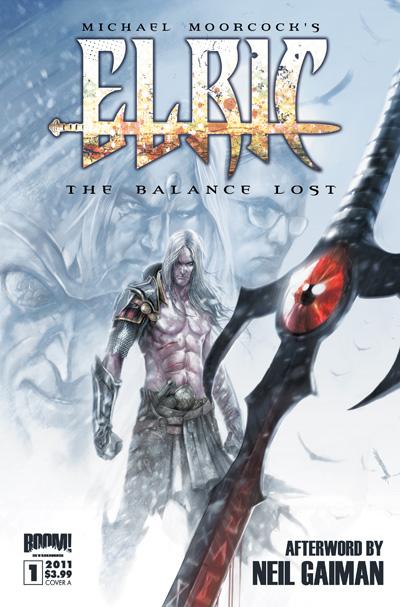Elric: The Balance 1
Reviewed by Peter Campbell 20-Jul-11
I’ve always had a fondness for Michael Moorcock’s Elric character. He’s an anomaly in the sword and sorcery genre: a melancholic , physically frail drug addict who, in order to survive, has to rely on sorcery and on souls fed to him by his vampiric, insatiable and ultimately treacherous sword. Rather than victory, he brings death and disaster to those around him, including the people he loves. In short, he’s the anti-Conan. Elric’s run in comics hasn’t been as successful as Conan’s, but then that’s cerebral limey writers for you.
I’ve always had a fondness for Michael Moorcock’s Elric character. He’s an anomaly in the sword and sorcery genre: a melancholic , physically frail drug addict who, in order to survive, has to rely on sorcery and on souls fed to him by his vampiric, insatiable and ultimately treacherous sword. Rather than victory, he brings death and disaster to those around him, including the people he loves. In short, he’s the anti-Conan. Elric’s run in comics hasn’t been as successful as Conan’s, but then that’s cerebral limey writers for you.
This is the latest attempt, and it’s an odd one. It’s set partially in the American mid-west, in the present day. A crisis is brewing and, rather unimaginatively, it’s a battle between chaos and order. Cue an assembling of the ranks: Elric himself, Dorian Hawkmoon, Corum, and Eric Beck (a modern day character, and pretty obviously another variant of Elric himself). All this suggests that this is going to be some sort of Moorcockian equivalent of Secret Wars, though for the moment all that is delivered are ominous portents and a gratuitous fight scene.
Chris Roberson clearly knows his source material (there’s a visual reference to Brecht, who was a big influence on Moorcock when he wrote the Elric stories) and handles it in a confident manner, without too many lapses into the realm of purple. The storyline follows a structure that alternates between the main characters, the scenes often linked by an image, or a phrase, a trick surely learned first or second hand from Alan Moore’s 1980s comics. The quieter moments are the most effective – Elric recounting his dream to a clearly disinterested girl in a bar, Hawkmoon in conversation with his daughter. In comparison, the hordes of monsters who attack Elric are only there to be dismembered in a not terribly imaginative fashion (and, presumably, to provide the comic with its token battle scene).
In fact it’s Elric who comes across as the least interesting character in this issue. He’s travelling alone in some sort of netherworld, and this blank setting, with its faux threats (let’s face it, he’s not going to be killed off in the debut issue of the series), lacks the grounding quality of other scenes in the comic. What Roberson has failed to grasp is that Elric in isolation isn’t hugely engrossing– it’s the catastrophic effect he has on those around him that provides the interest and the irony. Placing him in isolation also results in the annoying tendency for Elric to speak aloud, using rather clunky dialogue, in order to provide exposition for the events occurring: “I..I cannot. This world is too much in the grip of chaos for me to stabilize the gateway! Is the balance lost already?”
Francesco Biagini’s art is competent but rarely rises above that. There’s a stiffness to his characters’ poses and a limited range of expressions that nullifies his stronger points (the best perspective to view a scene from, the ability to handle a wide range of settings). He has a tendency to fracture the panel structure with no good reason – I can understand why he does this in a fight scene (a visual expression of the battle’s dynamic) but why do the same with a quiet, intimate scene set in Hawkmoon’s castle? And while his visualisation of Elric is striking, it palls alongside other artists’ interpretations, in particular Craig Russell’s haunted, enervated character.
There’s a better comic to be created from the source material than this. The main flaw here is the overall conception: place Elric in a multiverse, shorn of any background, and he becomes a superhero in drag. There are good points, and it’s an intriguing start to the series, but I’m not sure if the positive elements are strong enough to hold my interest during subsequent issues.
Tags: Boom!, Chris Roberson, Elric, Francesco Biagini, Michael Moorcock